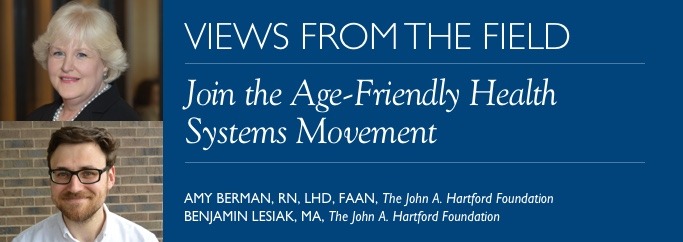
Amy Berman, RN, LHD, FAAN,, The John A. Hartford Foundation
Benjamin Lesiak, MA, The John A. Hartford Foundation
The Age-Friendly Health Systems initiative is an opportunity to build, together, more effective health systems that reliably deliver on the promise of better care for older adults. The US is in the midst of a historic demographic shift, with the population of older adults projected to double by 2060 (Colby 2017). This societal shift in the US, and around the world, reflects the remarkable advances in medications, health care technology, and public health interventions developed over the past century. As a result, older adults are poised to become this nation’s single greatest renewable resource, a resource befitting a new paradigm of care that supports better health outcomes for all of us as we age.
Most of us have experienced an older family member or friend interacting with the health care system because of injury or illness. Family members rush to the bedside knowing that, without their watchful eyes, mistakes can happen with tragic consequences. Older adults are a highly vulnerable population, experiencing disproportionate harms and deaths caused by medication errors (Maher 2014), delirium (Marcantonio 2017,) and falls (Bergen 2016), all examples of health system failures. The problem is not a gap in knowledge about what works. We have a strong body of evidence for what improves the care of older adults. The problem is a gap in the reliable implementation of that evidence. The models with the most evidence and scale reach only around 7 percent of the older adults who could benefit (Mate 2017). To address these critical gaps, The John A. Hartford Foundation launched the Age-Friendly Health Systems initiative in 2016.
Led by the Institute for Healthcare Improvement (IHI), in partnership with the American Hospital Association (AHA) and the Catholic Health Association of the United States (CHAUSA), the Age-Friendly Health Systems initiative is a movement that aims to improve the care of older adults everywhere they receive care, from hospitals and primary care to the kitchen table. The Age-Friendly Health Systems initiative is guided by three main principles: 1) adhering to evidence-based practice, 2) reducing harms through reliable implementation across settings of care, and 3) delivering care that is consistent with the goals and preferences of older adults.
What is an Age-Friendly Health System?
An Age-Friendly Health System is one that reliably provides effective, evidence-based care consistent with the “4Ms” framework developed by The John A. Hartford Foundation, IHI, experts in geriatric care, health system leaders, and older adults (Fulmer 2016). The 4Ms represent the essential elements of care for older adults. They are:
- What Matters
- Medication
- Mentation
- Mobility
The 4Ms, these vital few elements of care, represent a synthesis of the evidence about what helps to achieve the best health outcomes and reduce costs of care for older adults. They offer a feasible way of reliably streamlining the implementation of best practices for older adults across health care setting.
What Matters to the older adult is at the heart of the Age-Friendly Health Systems movement. All too often, older adults receive care that is inconsistent with their goals and preferences, leading to unwanted care and poor health outcomes. By systematically identifying and acting on What Matters to older adults, health systems are able to provide greater value and satisfaction for older patients and their families, as well as clinicians, and improve health outcomes at lower costs of care for health systems (Stuart 2012).
Medication is critical given that the proportion of older adults taking five or more prescriptions has tripled between 1988 and 2010, putting many at risk for dangerous drug-drug interactions (Charlesworth 2015). There are also drugs that are inappropriate for older adults as they are known to increase the risk for falls and delirium (impacting Mentation, Mobility and What Matters) (HRET 2017).
The next element, Mentation, refers to the mental status of older adults. Critical to maintaining cognitive function in older adults is the early identification and treatment of delirium in the hospital setting, and the assessment and management of dementia and depression in outpatient settings (Rubin 2011).
The final element in the 4Ms framework is Mobility. Health care providers have long focused on the prevention of falls, but once assessed as a risk, the strategy is often to immobilize older adults, leading to loss of function and creating an even greater falls risk. The Age-Friendly Health Systems initiative focuses on maximizing mobility in order to improve function, prevent falls and delirium, maximize independence, and ultimately to support What Matters to older adults (Klein 2015).
Implementing Age-Friendly Health Systems
The goal of the Age-Friendly Health Systems initiative is to spark a social movement with an initial goal of engaging 20 percent of US health systems by 2020 through the participation of 1,000 hospitals and 1,000 primary care clinics. Program implementation began in 2017 with five pioneering health systems: Anne Arundel Medical Center, Ascension, Kaiser Permanente, Providence St. Joseph Health, and Trinity Health. After prototyping the model in these pilot health systems, IHI launched the first learning collaborative of health care teams, known as an Action Community. In September 2018, the first Action Community was launched, which provided coaching on the evidence-based practices in the 4Ms, and tools and resources such as the Return on Investment Calculator to help understand the business case for age-friendly care. The second Action Community was launched in March of 2019. Today there are now 357 sites in 44 states that have participated in an Action Community.
The next Action Community, which will be led by the American Hospital Association (AHA), will begin in September 2019 and is currently accepting participants. Several state hospital associations and other organizations have expressed interest in running additional Action Communities, an opportunity for regional and state funders to help support the movement locally.
The rapid growth of the Age-Friendly Health Systems initiative highlights the critical role of private foundations and strategic partnerships. There is a strong evidence base for how to improve the care of older adults and the time is ripe for reliable implementation of age-friendly care. Foundations are uniquely positioned to spearhead this work locally the way Michigan Health Endowment Fund launched a Michigan Age-Friendly Health Systems Action Community, with other funders looking to launch Action Communities in New York, Virginia, and Massachusetts next. The Age-Friendly Health Systems initiative is an opportunity to build, together, more effective health systems that reliably deliver on the promise of better care for older adults.
References:
Bergen, Gwen. “Falls and fall injuries among adults aged≥ 65 years—United States, 2014.” MMWR. Morbidity and mortality weekly report 65 (2016).
Charlesworth, Christina J., et al. “Polypharmacy among adults aged 65 years and older in the United States: 1988–2010.” Journals of Gerontology Series A: Biomedical Sciences and Medical Sciences 70.8 (2015): 989-995.
Colby, Sandra L., and Jennifer M. Ortman. “Projections of the size and composition of the US population: 2014 to 2060: Population estimates and projections.” (2017).
Fulmer, Terry, and Amy Berman. “Age-Friendly Health Systems: How Do We Get There?” | Health Affairs, Health Affairs Blog, 3 Nov. 2016.
Health Research & Educational Trust (February 2017). Adverse Drug Events Change Package: 2017 Update. Chicago, IL: Health Research & Educational Trust.
Klein, Kate E., James F. Bena, and Nancy M. Albert. “Impact of early mobilization on mechanical ventilation and cost in neurological ICU.” A104. MOVING THE NEEDLE ON ICU-ASSOCIATED NEUROMUSCULAR WEAKNESS. American Thoracic Society, 2015. A2293-A2293.
Maher, Robert L., Joseph Hanlon, and Emily R. Hajjar. “Clinical consequences of polypharmacy in elderly.” Expert opinion on drug safety 13.1 (2014): 57-65.
Marcantonio, Edward R. “Delirium in hospitalized older adults.” New England Journal of Medicine 377.15 (2017): 1456-1466.
Mate, Kedar. “Forward Momentum: It’s Time for an Age-Friendly Health System.” Forward Motion Gaining Momentum for an Aging Society. Grantmakers in Aging Annual Conference, 19 Oct. 2017, Boston.
Rubin, Fred H., et al. “Sustainability and scalability of the hospital elder life program at a community hospital.” Journal of the American Geriatrics Society 59.2 (2011): 359-365.
Stuart, Brad, et al. “System-Integrated Program Coordinates Care for People With Advanced Illness, Leading to Greater Use of Hospice Services, Lower Utilization and Costs, and High Satisfaction.” AHRQ Innovations Exchange: Innovations and Tools to Improve Quality and Reduce Disparities, 24 Oct. 2012.

